A Field of Dreams Fantasy
Policy Puzzlement over President Biden's LNG Export Expansion Halt
In the movie Field of Dreams, a voice tells Kevin Costner “if you build it, they will come.” The biblical allusion was referring to building of a baseball diamond in an Iowa corn field, and “they” were famous historical baseball players, who emerged from the corn to play some baseball once again.
President Biden’s decision last week to halt the permitting of the continued expansion of U.S. liquified natural gas (LNG) export capacity had me thinking of the Field of Dreams, but in reverse — “If you don’t build it, they won’t need it.”1 The administration’s justification for the LNG export halt appears to be that the U.S. can influence demand for natural gas consumption simply by restricting supply. Don’t provide LNG and demand will thus go down, meaning less carbon dioxide emissions.
The policy logic of the LNG export expansion halt was recently laid out in a letter to President Biden out from a group of activists, including the University of Pennsylvania’s Michael Mann and Stanford’s Mark Jacobson:
Taken together, if all U.S. projects in the permitting pipeline are approved, they could lead to 3.9 billion tons of greenhouse gas emissions annually, which is larger than the entire annual emissions of the European Union. A forthcoming study by Cornell University climate scientist Robert Howarth shows that, even in the best-case scenarios, LNG is at least 24 percent worse for the climate than coal. Increasing LNG exports will mean increased extraction of fossil fuels and climate pollution and directs us away from a renewable energy future.
The study referenced above suggesting that LNG is worse than coal in terms of greenhouse gas emissions is by Robert Howarth of Cornell University, and is both contrary to a broad scientific consensus on this issue and a lone outlier.2
The idea that LNG is worse for the climate than coal is also contrary to the views of the Biden Administration’s Department of Energy, which has concluded that U.S LNG exports to Europe has far fewer emissions than coal or even LNG exports from elsewhere, as you can see below for Europe (Asia results not shown, but are similar). Regardless of exporting country, with respect to greenhouse gases, the DOE analysis concludes that LNG emits far less greenhouse gases than does regional coal.
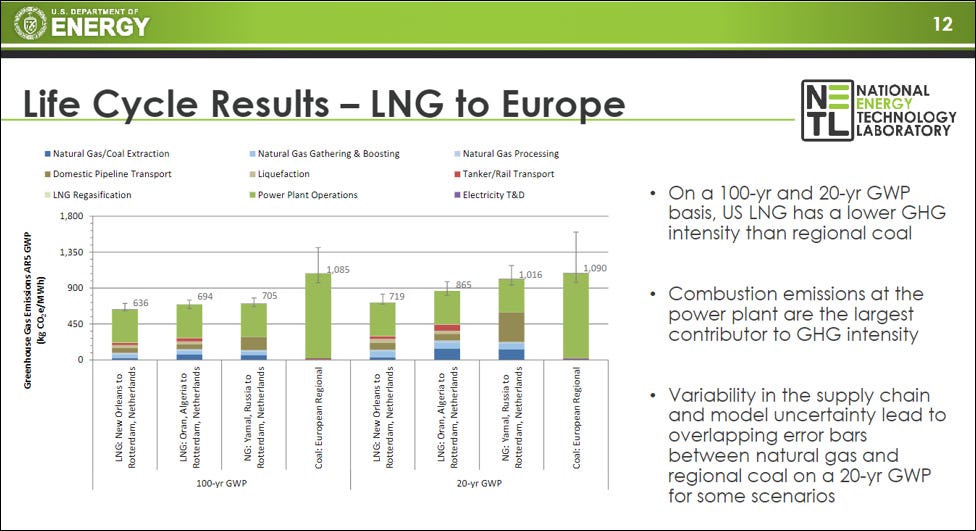
Despite the views of DOE, in announcing it’s LNG export expansion halt, the Biden Administration justified the move primarily in terms of climate change:3
President Biden has been clear that climate change is the existential threat of our time – and we must act with the urgency it demands to protect the future for generations to come. . .
Today, the Biden-Harris Administration is announcing a temporary pause on pending decisions on exports of Liquefied Natural Gas (LNG) to non-FTA countries until the Department of Energy can update the underlying analyses for authorizations. The current economic and environmental analyses DOE uses to underpin its LNG export authorizations are roughly five years old4 and no longer adequately account for considerations like potential energy cost increases for American consumers and manufacturers beyond current authorizations or the latest assessment of the impact of greenhouse gas emissions.
The Biden Administration’s LNG export expansion halt may or may not be good policy. However, it does raise three concerns.
First, the Biden Administration has made a decision before producing the evidence on which such a decision is supposed to be based. This situation imposes strong incentives for the future creation of policy-based evidence to justify a decision that has already been made. This is not the first time that the Biden Administration decided first and assessed science later. It would have been more appropriate for the Biden Administration to first update its assessment of the costs and benefits of continued LNG export expansion, and only then, with evidence in hand, to decide whether such expansion remains in U.S. national interests.
Imagine a similar situation — In 2026, a second term President Trump announces a halt to implementation of federal agency action on climate change because the most recent IPCC assessment is 5 years old. The Trump administration explains that we will reconsider such implementation when the next report comes out in 2028 or 2029. Until then, we just don’t know if the science is current, so we must not act. That would of course be absolutely ridiculous and an affront to the very idea of evidence-informed policy making.
The Biden White House has not been shy about celebrating the LNG export expansion halt as a political victory for its environmental constituency, independent of its policy impact. Environmental activist Bill McKibben — who has spearheaded the effort to make LNG exports the next Keystone XL — has already signaled that he thinks any future scientific assessment will be irrelevant anyway:
. . . I have a beer in my hand. If the administration backtracks, it will be a disappointment of epic proportion that I can’t imagine them doing it.
A second concern is that the Biden Administration has said little about the geopolitical and security implications of the decision. According to an outstanding and comprehensive analysis by Rystad Energy, Europe has a continuing large gap between contracted and needed LNG supplies to 2040, as you can see below.
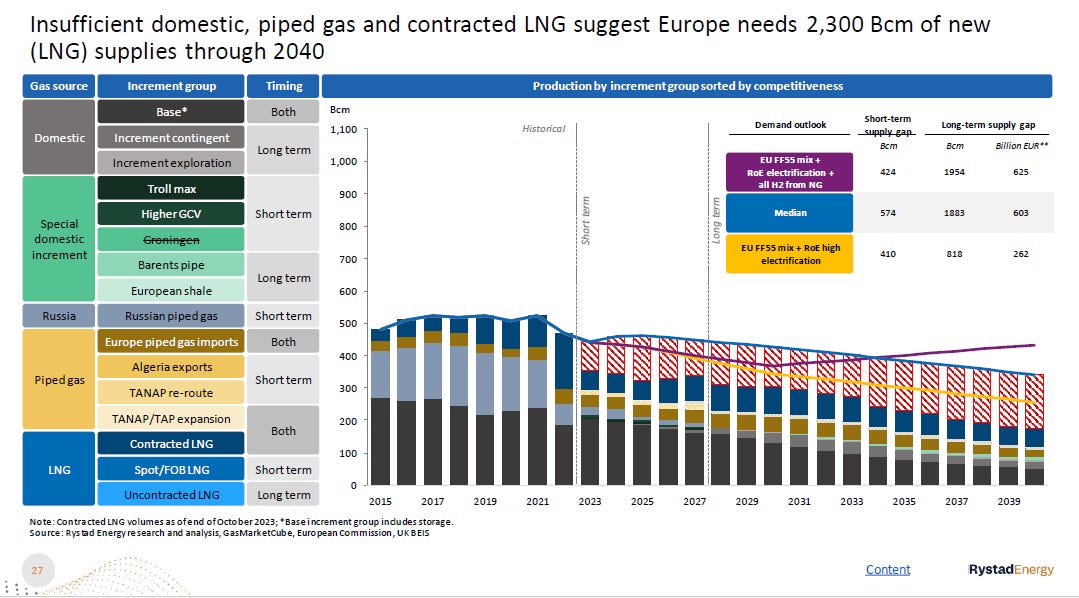
Rystad Energy further finds that the U.S. is well positioned to meet Europe’s contracted LNG supply gap, “provided that US midstream infrastructure is developed as required,” and after meeting all U.S. demand, as you can see below.
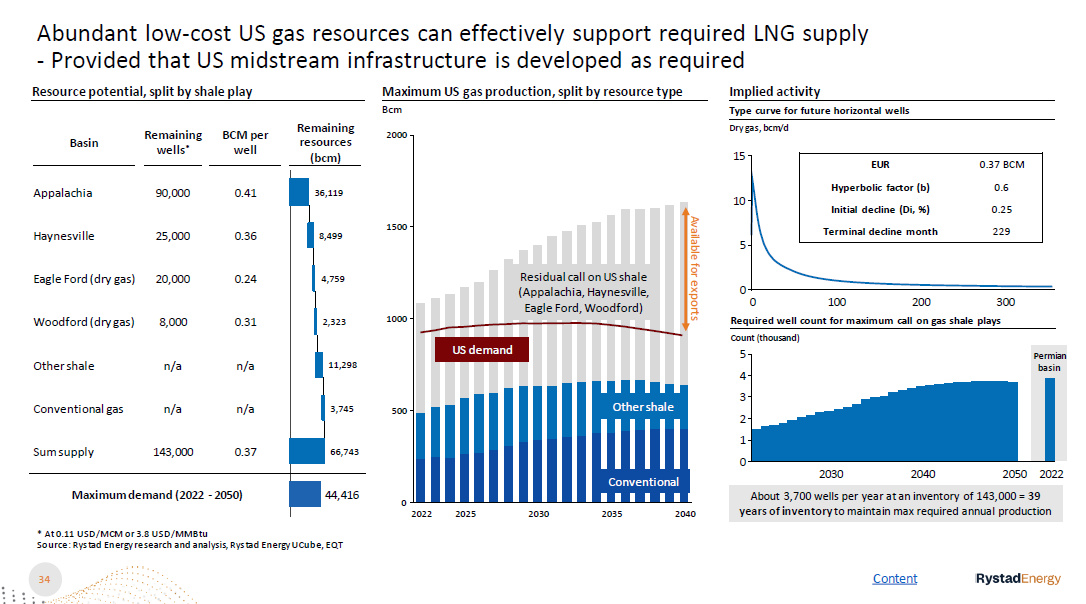
If Europe needs natural gas, then it is safe to say that it will not do without in the absence of expanded U.S. exports — instead Europe will turn to Iran, Qatar, or even back to Russia to secure supply, as there are only a small numbers of key players in the LNG market, as you can see below.
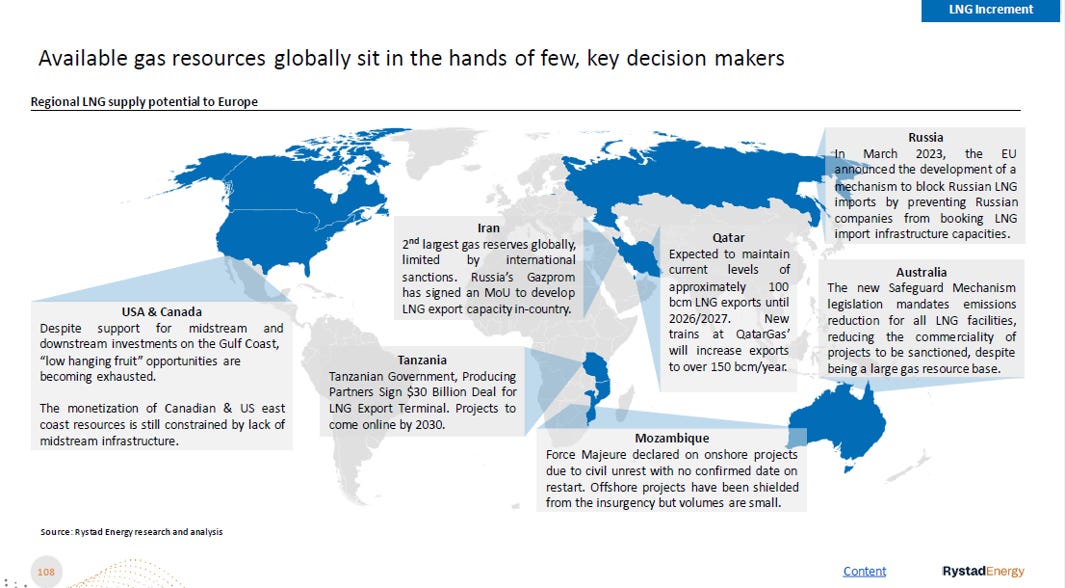
The Field of Dreams fantasy is the notion that restricting supply of LNG will force those who would otherwise use natural gas to instead turn to wind and solar energy. The causal policy chain that underlies such thinking is delusional. If wind and solar could replace LNG imports, then they already would without the U.S. limiting its exports. The reason that countries increasingly rely on LNG is because it is more reliable, more secure, and more economic than the current alternatives. A U.S. export expansion halt will simply mean that buyers in Europe and Asia will look to new suppliers.
A third concern is that the Biden Administration’s decision makes little mention of economics — for the American consumer and the global LNG market.
The Environmental Protection Agency projected in 2023 that under all scenarios of implementation of the Inflation Reduction Act that is has considered, U.S. demand for natural gas will go down over the next decade, as you can see below. All else equal, with constant U.S. supply, that means we should expect natural gas prices to fall in the U.S. — of course, changes in demand will affect the economics of supply.
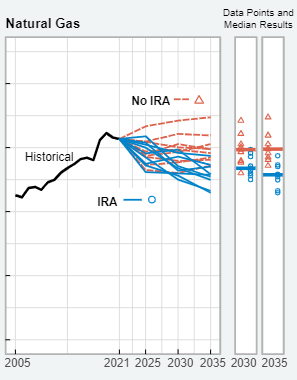
The costs of natural gas to the American consumer are dependent upon U.S. supply, which in turn is dependent upon U.S. federal regulations governing natural gas production. The Field of Dreams fantasy holds that political activism can limit the supply of fossil fuels, making them more scarce, creating upwards price pressures — a shadow carbon price — and alternatives to fossil fuels will thus be more competitive and thus preferrable.5 Accelerated decarbonization is the outcome, this theory holds.
This logic runs right into the iron law of climate policy — people actually do not want higher priced energy and energy services. Shocker. That is why the Biden Administration has quietly overseen the expansion of U.S. oil and gas production to record levels.6
More broadly, if the U.S. limits expansion of LNG exports, all else equal that would imply higher prices for LNG around the world. Of course, all else is not equal, and if the U.S. limits its exports then international flows of LNG will rebalance with new suppliers that fill the gap. We should expect little impact on the global price of LNG, just a reshuffling of suppliers, and the idea of a shadow carbon price will not be fulfilled in any case.
So how do make sense of the Biden Administration’s LNG export expansion halt? Here are a few suggestions:
Cynical. It is just an election-year ploy to keep environment supporters onside and the halt will be reversed after Biden wins reelection.
Uniformed. The Biden Administration actually believes in the Field of Dreams fantasy that they can impose a shadow carbon price via supply restrictions, and accelerated decarbonization will result.
Clever. Perhaps the Biden Administration has quietly negotiated opportunities for increasing LNG exports among key allies, to make up for the U.S. limits, with no impact on global LNG supplies and security.
Other suggestions?
Thanks for reading! I welcome your comments, corrections, pointers and critique. Remember, THB is reader supported and exists because of your support. Please consider subscribing or upgrading!
Legislative authority for federal regulation of natural gas can be found in the Natural Gas Act of 1938.
The story behind the new Howarth study is for another day. I’ll just note here that in 2012 Howarth told a reporter that he was performing anti-fracking research for hire — The reporter explained: “In an interview, Howarth told me his goal was to make the anti-fracking movement mainstream and fashionable. He said he met with the Ithaca-based [Park] foundation two years ago, agreeing to produce a study challenging the conventional wisdom that shale gas is comparatively clean...Howarth hired an aggressive PR firm, the Hastings Group, to promote his politicized viewpoint. ”
Note that non-FTA countries in the statement refers to countries other than the 20 which the U.S. has in place a free trade agreement.
The five-year old DOE analysis referenced in the White House statement is likely this report: LIFE CYCLE GREENHOUSE GAS PERSPECTIVE ON EXPORTING LIQUEFIED NATURAL GAS FROM THE UNITED STATES: 2019 UPDATE. That report does not consider economics or the social cost of carbon.
This theory is not completely off target — a shadow price has been successfully imposed upon nuclear power in the U.S. via regulation, and that shadow price has limited nuclear expansion.
Honestly, the Biden Administration is wielding a Jedi Mind Trick on environmentalists — simultaneously being characterized as the most consequential climate president ever AND dramatically overseeing the expansion of U.S. oil and gas production. These are definitely not the droids you are looking for.





Chemistry 101:
Natural gas: CH4 + 2O2 = CO2 + 2H2O
Coal: C + O2 = CO2
Natural gas produces less than half of the CO2 emitted by coal per BTU
The environmental impacts of mining, transporting and burning coal are much worse
Biden's war on natural gas is plain stupidity - just one of many
I think you're giving the administration too much credit for having a well-conceived, long-term policy. This looks more like an election-year ploy to lower domestic energy prices by bottling up natural gas in the US. The last election cycle they tried to achieve the same result by draining the SPR, but that's too low now to risk doing it again, so an export ban on LNG accomplishes the same objective.